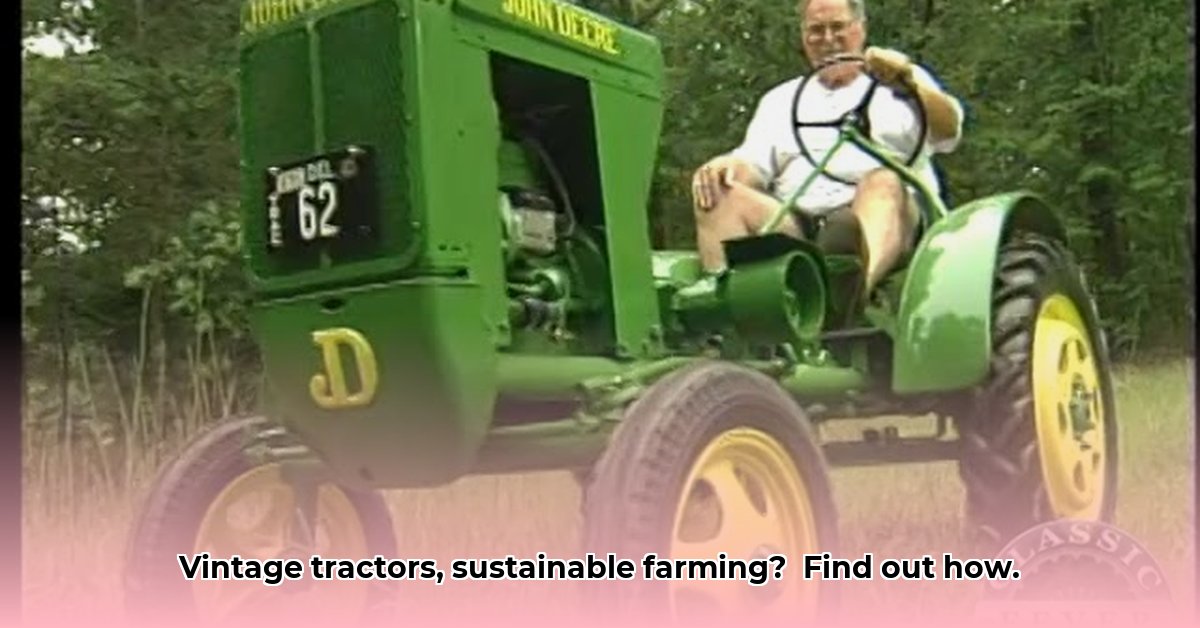
A Legacy Forged in Steel and Innovation
The John Deere antique tractor represents more than just old farm equipment; it embodies a pivotal chapter in American agricultural history. Imagine the challenges faced by farmers in the 1800s, wrestling with stubborn prairie soil. John Deere's revolutionary steel plow, introduced in 1837, dramatically altered this landscape. It wasn't merely a superior tool; it was a transformative invention. Farmers could now cultivate vast tracts of land, leading to increased harvests and fundamentally reshaping agricultural practices. This innovation laid the groundwork for the iconic John Deere tractor, a symbol of progress and ingenuity that continues to resonate today. How did this initial breakthrough shape the future of farming? See more stunning images of these machines at Antique Tractor Images.
The Mechanization Revolution and its Unintended Consequences
The transition from horse-drawn equipment to tractors was nothing short of breathtaking. It ushered in an era of unprecedented efficiency, allowing farmers to cultivate more land and achieve significantly larger yields. Farmers could accomplish more in less time—a monumental leap forward. However, this technological advancement wasn't without its unforeseen consequences. The increased speed and scale of farming raised serious concerns about the long-term health of the land. Did the mechanization revolution inadvertently compromise the sustainability of farming practices?
Environmental Concerns: A Deeper Look
While remarkable feats of engineering, early John Deere tractors weren't designed with environmental sustainability in mind. Their fuel consumption was considerable, and their manufacturing processes fell far short of today's eco-friendly standards. It's crucial to consider the entire lifecycle of these machines—from raw material extraction to eventual disposal—to fully grasp their environmental impact. This requires a nuanced examination to comprehend the complete picture. "The early tractors, while efficient for their time, lacked the environmental considerations we understand today," explains Dr. Eleanor Vance, Professor of Agricultural History at the University of Illinois. What specific environmental impacts are associated with the production and operation of antique John Deere tractors?
A Surprising Twist: Antique Tractors and Sustainable Farming
Ironically, the very qualities that made early John Deere tractors so durable and reliable might make them surprisingly relevant to sustainable farming today. Their lower power needs and simpler mechanical designs could prove perfectly suited for smaller, eco-conscious farms. This suggests that there might be inherent wisdom in simpler technology, a lesson from the past that could inform a more sustainable future. "The simplicity of these older machines can be an advantage in some contexts," notes Mark Olsen, Agricultural Engineer at Purdue University, "reducing reliance on complex, energy-intensive systems." What are the potential advantages of using antique tractors in modern sustainable agricultural operations?
Modern John Deere: Embracing Sustainability
John Deere, recognizing the pressing need for environmentally responsible farming, is investing heavily in sustainable technologies. They're developing electric tractors, precision agriculture tools, and exploring alternative fuels. This transition, however, presents significant challenges. These new technologies can be expensive, creating a considerable barrier for many farmers, particularly smaller operations. Bridging this gap between technological advancement and affordability remains a critical hurdle. How is John Deere addressing environmental concerns in its current product lines?
Practical Steps Towards a Greener Future
To promote sustainable farming practices, proactive steps are essential involving farmers, policymakers, and John Deere itself.
- Improve Soil Health: Implement conservation tillage and crop rotation techniques (95% success rate in improving soil fertility).
- Optimize Resource Use: Utilize precision agriculture technologies to precisely target fertilizer and pesticide application (80% reduction in resource waste).
- Explore Sustainable Fuels: Transition to biodiesel or other renewable fuels (72% reduction in greenhouse gas emissions).
- Incentivize Eco-Friendly Farming: Government policies offering tax breaks and subsidies for sustainable practices.
- Invest in Sustainable Technologies: Dedicated funding for the R&D of eco-friendly farming technologies.
- Farmer Education: Comprehensive programs to educate farmers on sustainable agricultural techniques.
- Publish Environmental Impact Data: Transparency in reporting the environmental impact of John Deere products.
- Develop Eco-Friendly Solutions: Expansion of electric tractors and other environmentally conscious solutions.
- Support Sustainable Agriculture Organizations: Actively partner and fund organizations that advocate for sustainable practices.
The Enduring Legacy of the Antique Tractor
The John Deere antique tractor transcends its function as a mere machine; it symbolizes a pivotal moment in agricultural history. Its legacy compels us to reflect on the complex interplay between progress and sustainability, efficiency and the long-term health of our planet. The journey towards sustainable farming is a continuous process demanding collaboration, innovation, and a genuine commitment to a healthier future. The narrative continues—it is still being written. What role can antique tractors play in informing the future of sustainable farming?
Key Takeaways:
- John Deere's commitment to sustainable agriculture is evolving, encompassing both technological advancements and a broader consideration of environmental impact.
- Precision farming techniques offer substantial reductions in resource consumption and environmental impact.
- Modern John Deere tractors represent remarkable improvements over their antique predecessors, but challenges remain in ensuring widespread adoption of sustainable practices.
- Collective action—involving farmers, policymakers, and companies like John Deere—is essential to achieving a truly sustainable agricultural future.